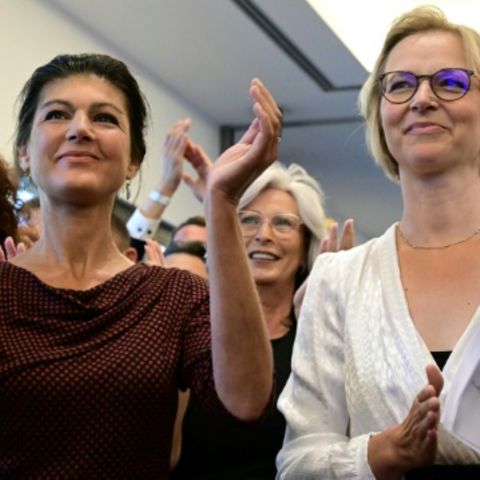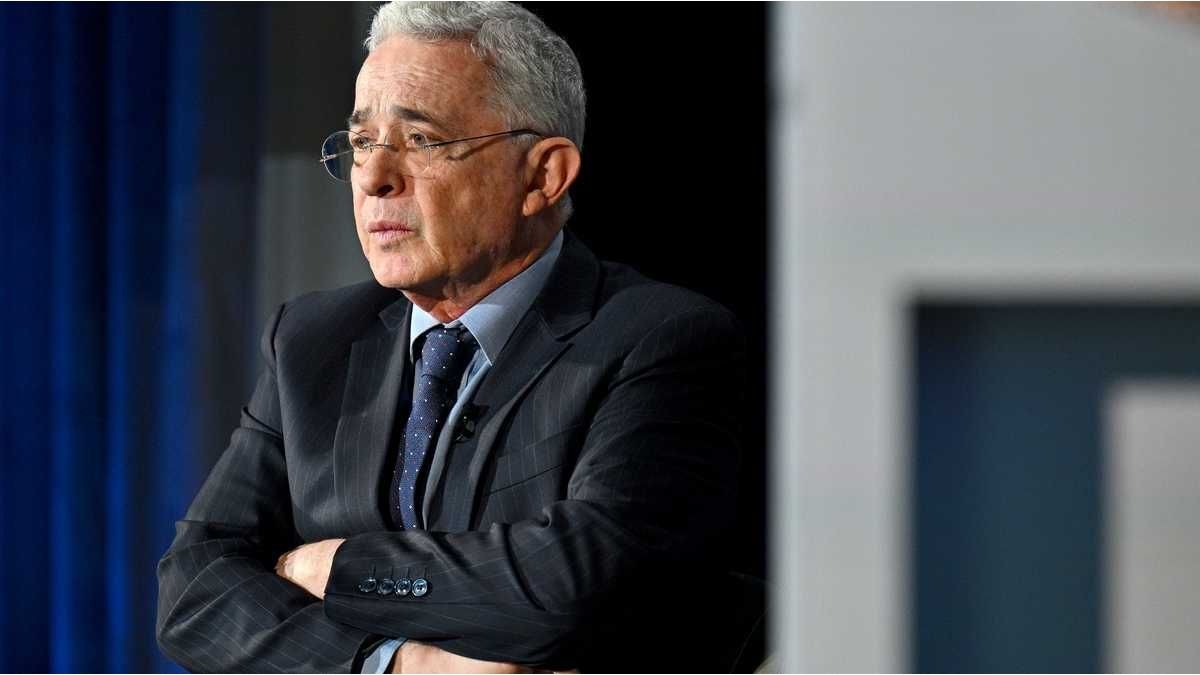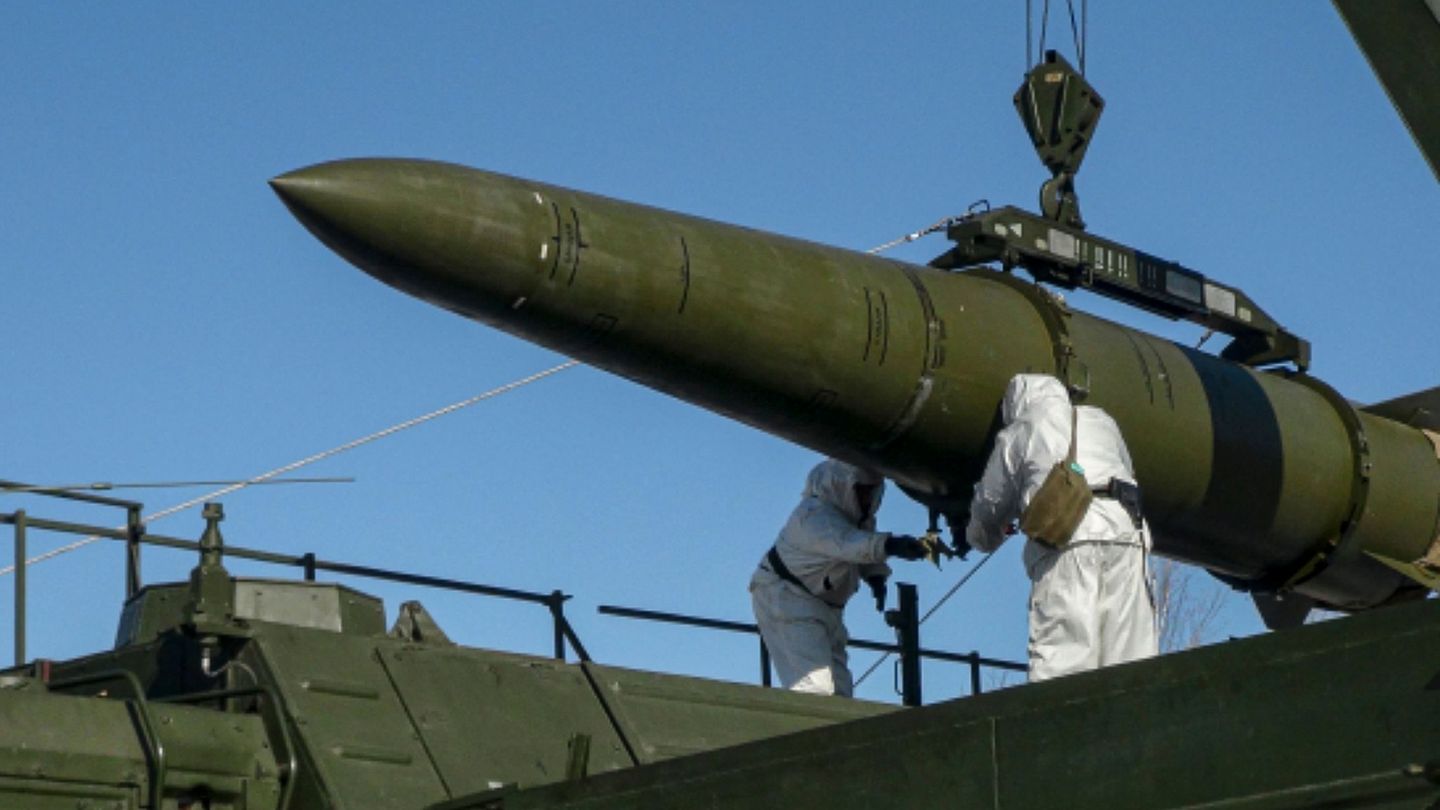New toughness from the CDU boss
Why Friedrich Merz is suddenly giving Russia ultimatums
Copy the current link
The CDU candidate for chancellor calls Olaf Scholz a coward and wants to deliver cruise missiles to the war zone. The BSW also plays a role in Merz’s new toughness.
speaks for almost 40 minutes when something like a mood arises in the hall. “Hesitancy is not interpreted as prudence, but rather as cowardice,” rumbles the Union’s candidate for chancellor in the direction of Chancellor Olaf Scholz (SPD). “We have to do more to defend ourselves!” he shouts. “We have to do more for our freedom!”
Huge cheers erupt at the Junge Union’s Germany Day in Halle (Saale). Finally something like an attack in an otherwise rhetorically restrained speech. That was almost a week ago now.
This scene is an example of a new clarity in Merz’s Russia course, the calculation of challenging the Bundestag election campaign in this sensitive field and a risky strategy in dealing with Sahra Wagenknecht. But the new hardship is not without risk.
Merz was reluctant to remain silent about Ukraine
People who know Merz well say that the 68-year-old has withdrawn in recent months with just his fist in his pocket. Before the state elections, the CDU regional associations in the east in particular had asked him to express himself less aggressively.
In the Union parliamentary group board in June, Merz folded foreign politician Roderich Kiesewetter for his public solo efforts. He is considered one of the loudest Ukraine supporters in the Union. There was speculation that Merz would change course.
A crucial question arose: Is Merz sacrificing Ukraine for the Union’s electoral success?
The state elections in Brandenburg are now 39 days ago, and those in Saxony took place two months ago. Coalitions are still being negotiated, of all things with the Russia-friendly alliance Sahra Wagenknecht (BSW). So restraint from Berlin might still be necessary. But Friedrich Merz no longer wants to hold back.
And Olaf Scholz, the scaredy-cat, sits in the Chancellery
On Sunday, one day after his speech at Germany Day, Merz followed up: “If we in the West are afraid to defend ourselves, then Putin has already won half of it,” said Merz in the “Report from Berlin.” Things are now about to change the question of how confidently one can counter its aggression. “The only one standing in the way is the German Chancellor. And he’s obviously afraid,” said Merz. This message is obviously intended to reach the people: Here stands Frederick, the brave. Olaf Scholz, the scaredy-cat, sits in the Chancellery.
Of course, it’s not that simple: Under Scholz, Germany is one of Ukraine’s largest donor countries, both financially and militarily. Scholz organized an alliance for more air defense and made more money for Ukraine than other countries were already skimping on. But the Chancellor also stands for a course of restraint, clear red lines when it comes to German participation: no delivery of the Taurus missiles, no release of German weapons for the shelling of Russian territory, no direct German support for Ukraine.
Merz is crossing these red lines: in the Bundestag he demanded an ultimatum to Russia. If the Russian army does not stop bombing residential buildings within 24 hours, Germany must be ready to supply Taurus cruise missiles. He quoted French philosopher Michel de Montaigne: “Fear is the mother of all cruelty,” and stressed that it is time to overcome this fear in order to end the atrocities in Ukraine.
Merz and his strategists have recognized the Chancellor’s cautious Ukraine policy as an opportunity. The Union Chancellor candidate now wants to demonstrate leadership – and thus distance himself from Scholz. According to the ZDF political barometer, only 16 percent of people attest to him being a strong leader, while 76 percent consider him to be a weak leader. Once again a Basta chancellor à la Gerhard Schröder, someone who speaks straight, in main sentences, something that many people in the SPD long for. And Basta say, Friedrich Merz can do that.
Kiesewetter hopes for Germany to play a leading role under Merz
Roderich Kiesewetter is happy about this new Friedrich Merz. The CDU foreign politician, who was reprimanded by Merz in the summer, is now praising his Ukraine course: “As Chancellor, Friedrich Merz would organize real, joint European support for Ukraine and strengthen our personal responsibility for security, instead of always just acting like Olaf Scholz to show the Americans,” Kiesewetter told the star. “Friedrich Merz would finally pursue a clear strategy of strength instead of letting Putin continue to blackmail him.” This is shown by his appearance in the German Bundestag.
For the SPD and Olaf Scholz, Merz’s new clarity comes in a difficult phase: In Brandenburg, the Social Democrats, together with the BSW, spoke out against the stationing of US medium-range missiles in Germany, including against their own Chancellor. The new SPD General Secretary Matthias Miersch gave an interview in star sparked a debate about how to deal with former Chancellor and Putin friend Gerhard Schröder.
Johannes Winkel, head of the Junge Union, said this star about this: “The rehabilitation of Schröder by Matthias Miersch shows: The SPD is deciding to turn the tide.” This is irresponsible for the security of Germany and Europe, said Winkel. “The SPD is stoking the fears of the Germans instead of showing strength with Poland and France,” said the head of the Union’s youth party. “With the substantive rapprochement with Russia, a coalition with the BSW at the federal level also appears to be being prepared.”
But the Union itself also has to deal with the BSW: In Thuringia and Saxony, the state associations are negotiating with Sahra Wagenknecht’s party. Anger over Merz’s new clarity can be heard from these regional associations. Does he want to politically prevent the alliance without having to say so openly?
In the Konrad-Adenauer-Haus they are hoping for something different: the BSW should be put under such pressure that Wagenknecht has to enter into conflict with their regional associations. In Thuringia this seems to have worked for the time being; However, the outcome of the power struggle between Wagenknecht and BSW regional director Katja Wolf is open. In any case, it is important for the Union party leadership to urgently avoid the impression that it is sacrificing its own ties to the West for possible coalitions in the East.
Friedrich, the hothead?
Merz’s course is a risk. A third of Germans now want to support Ukraine less than before, and almost another third want to leave arms aid at the current level. Whether there really are majorities for rhetorical escalations and ultimatums à la Merz? Questionable.
The SPD is now trying to portray the candidate for chancellor and Scholz’s great opponent as a gambler. “Friedrich Merz is an incredible hothead who allows himself to be led far too easily by his emotions,” said Secretary General Miersch recently star. Here Friedrich, the hothead and there Olaf, the level-headed one. The danger for the Union is that the Germans’ fear of war turns against Merz. Would he then rather be silent again?
Source: Stern
I have been working in the news industry for over 6 years, first as a reporter and now as an editor. I have covered politics extensively, and my work has appeared in major newspapers and online news outlets around the world. In addition to my writing, I also contribute regularly to 24 Hours World.





